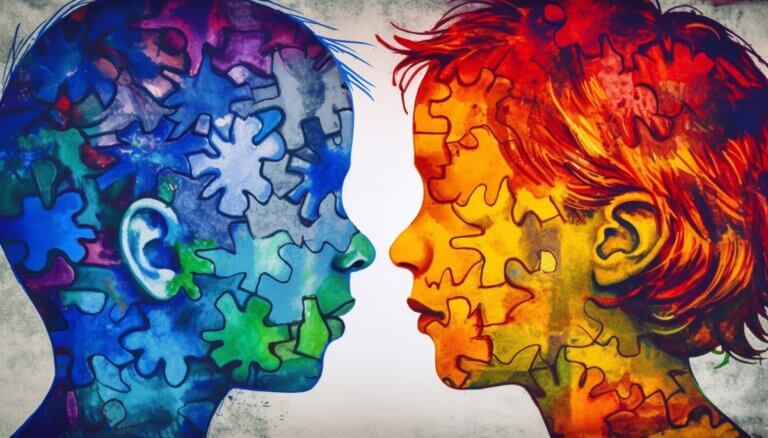Table of Contents
Emotional Intelligence in Conflict Resolution

Self-Awareness as the Cornerstone
Emotional intelligence is an essential component of successful conflict resolution in the workplace. It enables leaders not only to identify conflicts but also to manage them effectively and diplomatically. Here, self-awareness plays a crucial role, as self-analysis and reflection of one’s own emotions empower leaders to resolve workplace conflicts more effectively. A profound understanding of emotional dynamics leads to strengthened self-confidence and the ability to keep a cool head even in heated debates.
The Practice of Self-Awareness
Imagine a leader standing in the midst of a heated dispute between employees. Emotional intelligence conflict management starts here with the ability to recognize and regulate one’s own emotions before they affect the team. The practical example shows that a sovereign leader, through active listening and the use of empathetic communication, helps employees feel understood and reduces tensions.
- In workplace conflicts, self-awareness aids in identifying personal triggers and questioning automatic reactions.
- Emotional conflict resolution means not suppressing emotions but consciously using them to de-escalate the situation.
- For leadership strength in conflicts, it is essential to know one’s emotional boundaries and communicate them.
Keeping a Cool Head in the Heat of Battle
Emotional intelligence sharpens the self-perception of leaders, enabling them to control their emotional responses. Instead of responding to attacks with counterattacks, they use strategies of conflict resolution and emotional intelligence to steer the conversation in constructive directions. By setting an example of calm handling of stress and conflict situations, they shape a corporate culture marked by emotional competence and resilience.
In another example, a leader demonstrates their emotional intelligence in dealing with criticism. Instead of reacting defensively, they take time to reflect on the comments and show through empathetic feedback that they take the concerns seriously. This type of response promotes an open communication culture and enhances trust within the team.
The ability to understand, regulate, and constructively use one’s own emotions is a sign of genuine leadership strength. Through conscious self-reflection and the application of techniques of emotional self-control, a conflict is not only addressed but actively resolved. Emotional intelligence thus becomes a key tool for any leader to succeed in daily interactions at the workplace and lead conflicts to a positive outcome.
Empathy as a Bridge to Others
The Power of Empathy
At the heart of emotional intelligence lies the ability to not only recognize and manage one’s own emotions, but also to understand and respect the feelings of others. Empathy – the ability to put oneself in someone else’s shoes – is a crucial factor that creates an atmosphere of trust and cooperation. Especially in the field of leadership in conflicts, empathy provides an irreplaceable approach for conflict resolution emotional intelligence. An empathetic leader can perceive the needs of their employees and thus lay the foundation for effective emotional conflict resolution.
- A manager who truly understands the concerns of their employees will not judge hastily in workplace conflicts, but will first listen and empathetically engage with the affected parties.
- A team leader who practices empathy can interpret the nonverbal signals of the staff and thereby uncover hidden sources of conflict before they escalate.
- An empathetic approach in employee discussions promotes openness and honest communication, thus forming the basis for sustainable conflict resolutions at work.
Empathy as a Leadership Tool
Empathy, as a component of emotional intelligence, is essential in management, not just desirable. In conflict management, it enables a deeper insight into interpersonal dynamics and supports the development of a trusting relationship. It is important that the leader maintains a balance between professional distance and personal interest. Empathy should not be confused with pity – it is more about developing an understanding for the other person’s position and acting on that basis.
For example, an empathetic supervisor during times of workplace conflicts can sense when the workload on a team is too high and proactively take steps to reduce the pressure. This shows employees that their feelings are taken seriously and strengthens the leadership position in terms of emotional intelligence conflict management.
Ultimately, empathy in the business environment is not a weakness, but a strategic strength that significantly contributes to the resolution of workplace conflicts. Emotional intelligence, especially empathic competence, helps to clarify misunderstandings, reduce friction, and enhance cooperation. By demonstrating empathy, leaders inspire their environment and pave the way for a culture where conflict resolution through emotional competence becomes the norm.
Emotional Intelligence as a Leadership Tool

Emotional Intelligence as a Leadership Tool
Emotional intelligence is the key to keeping a cool head in challenging situations. Especially leaders are often at the center of workplace conflicts and are called upon to find ways how emotional conflict resolution can be successfully applied. By developing strong self-regulation, they gain the ability to better control their own emotions. This not only affects their own well-being but also significantly shapes the atmosphere at the workplace.
Maintaining composure: the foundation of self-regulation
To avoid losing control in critical moments, it is important to learn preventive methods of emotion control. This includes the set of techniques of mindfulness, which allows one to be aware of their feelings without being overwhelmed by them. Suppose a project is under bad omens and the team members start to panic. A leader who has integrated mindfulness practice remains composed in such moments, can assess the situation neutrally, and act in a solution-oriented manner.
Show empathy, but set boundaries Crucial for emotional intelligence conflict resolution is also showing empathy for employees without getting too drawn into their emotional states. It is about understanding the situation and the sentiments of the team, yet acting in the interest of company goals and with leadership strength in conflicts.
The power of positive self-talk
Another important self-regulation technique is constructive self-talk. Imagine being in a meeting where there is a heated exchange. Instead of reacting defensively or aggressively, successful leaders use positive self-talk to calm their thoughts and remain rational. “I stay calm and focused” can be a mantra that is helpful in such moments.
Promoting conflict management through training To enhance emotional intelligence conflict management in the workplace, it is advisable to attend corresponding trainings. These not only provide theoretical knowledge but also practice with participants in role-plays and group work on how they should react in real-life scenarios. Thus, emotional competence becomes second nature and can be applied in real challenges.
- Emotional intelligence conflict resolution begins with one’s own ability to identify and control emotions.
- Techniques of mindfulness and establishing positive self-talk are effective tools of self-regulation.
- Trainings can support leaders in developing these skills and applying them practically.
The responsibility of leaders is to guide the team safely and confidently not only in calm waters but especially when the waves are high. Emotional intelligence and the associated self-regulation embody leadership strength in conflicts. They enable a leadership style based on trust, resilience, and integrity.
Social Skills for Harmonious Coexistence
Emotional intelligence is the ability to recognize, understand, and manage one’s own emotions and those of others. This skill is particularly invaluable in the workplace, as it helps promote harmonious interactions and effectively resolve conflicts.
Conflict Resolution through Emotional Intelligence
Leaders often face the challenge of resolving conflicts between team members. Emotional intelligence plays a key role in conflict management in the workplace. By being aware of and controlling one’s own emotional reactions, a leader can, for example, avoid escalation and instead create an atmosphere of understanding. Thus, emotional conflict resolution contributes to a factual discussion of the problem without interpersonal tensions having a lasting impact on the work environment.
- Emotional Self-Awareness: Leaders who understand their own emotions can use this information to adjust their behavior and empathetically respond to their employees.
- Emotional Self-Management: The ability to control impulses and act professionally even in stressful situations is crucial for leadership strength in conflicts.
- Social Awareness: A deep understanding of others’ emotions allows for adequately addressing needs and concerns and strengthening team spirit.
Practical Application of Emotional Intelligence
A practical example illustrates the importance of emotional intelligence in conflict management: Imagine two colleagues disputing over a project disagreement. An emotionally intelligent leader quickly recognizes the rising tensions and initiates a clarifying conversation. In doing so, they actively listen, reflect emotional expressions, and motivate the participants to find common solutions. Thus, not only are the emotions calmed, but mutual understanding and the willingness to collaborate are also strengthened.
Promoting a Culture of Emotional Intelligence
Finally, it’s about how to create a lasting culture of openness and dialogue in the workplace. Training programs for Emotional Intelligence and regular feedback can help develop and maintain these essential social skills. A transparent leadership style that encourages the expression of emotions and views conflicts as opportunities for growth forms the foundation for a stable, efficient, and satisfied workforce.
By actively promoting emotional intelligence among leaders and employees, companies can not only improve conflict resolution but also enhance collaboration and overall well-being at the workplace.
Summary
In the modern workplace, workplace conflicts are among the daily challenges that leaders face. Managing these conflicts requires a high level of leadership strength in conflicts, and here, Emotional Intelligence in Conflict Management plays a crucial role. Emotional Intelligence (EI) is the toolkit that allows not only understanding and regulating one’s own emotions but also those of employees. High EI significantly contributes to conflict resolution through Emotional Intelligence and enables managing conflict situations with diplomacy and foresight.
The Four Pillars of Emotional Intelligence in Conflict Management
In conflict resolution, four core aspects of EI are particularly relevant:
- Emotional Self-Awareness: The ability to recognize one’s own emotions early is fundamental. Leaders who understand their feelings can use this information to act appropriately.
- Self-regulation: Effective emotional conflict resolution requires controlling impulses and remaining composed under pressure. Techniques such as mindfulness and positive self-talk support this.
- Social Awareness: A deep understanding of others’ emotions helps address the needs of team members and thus strengthen cooperation.
- Relationship Skills: The skill to maintain constructive relationships and approach others with empathy promotes a culture of dialogue and understanding.
In practice, Emotional Intelligence conflict resolution looks like leaders actively listening in challenging conversations, responding emotionally, and thus stimulating trust and cooperation. Training and regular feedback assist in further developing EI skills.
Emotional Intelligence as a leadership competency is therefore not an option but a necessity to be successful in the workplace. A culture of EI not only facilitates resolving acute workplace conflicts but also strengthens the well-being and efficiency of the entire team over the long term. Leaders who act with emotional intelligence thus become pioneers of a work culture characterized by resilience, integrity, and mutual understanding.
FAQ – Conflict Resolution through Emotional Intelligence
How can leaders use active listening as part of their emotional intelligence to effectively resolve conflicts within the team?
Leaders can utilize active listening by consciously taking the time to understand the perspectives and feelings of their team members without prematurely judging or imposing solutions. This approach fosters a climate of trust and openness, where employees feel valued, which in turn facilitates conflict resolution, as solutions are based on a deeper understanding of the underlying issues. Through reflective feedback and targeted questioning, leaders can ensure that all parties feel heard and that collaborative solutions are developed, leading to sustainable team success.
How can leaders apply emotional intelligence techniques to effectively resolve conflicts between team members?
Leaders with high emotional intelligence can first defuse conflict situations through active listening and empathy by valuing and acknowledging the feelings and perspectives of all involved. With this foundation, they promote open and honest communication, enabling team members to develop joint solutions and strengthen mutual understanding. By acting as models of emotional competence, they inspire their team to handle conflicts constructively and lay the groundwork for a cooperative and resilient work environment.
How can leaders effectively resolve workplace conflicts with the help of emotional intelligence?
Leaders with high emotional intelligence first recognize and understand the emotional dynamics underlying a conflict by actively listening and showing empathy. They then use these insights to foster an open dialogue where all participants can share their feelings and perspectives factually. Through skilled negotiating and targeted de-escalation, they create an atmosphere of cooperation and mutual respect, leading to constructive, sustainable solutions.




